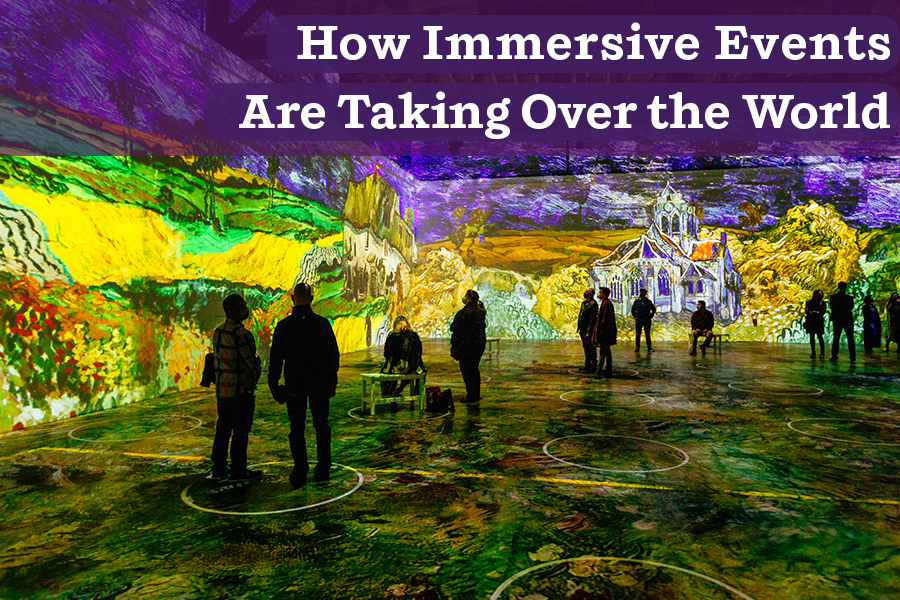Introduction
Immersive events are revolutionizing the events industry by creating experiences that fully engage the senses and transport participants into extraordinary environments. These events leverage cutting-edge technologies such as virtual reality (VR), augmented reality (AR), and interactive elements to create unique, unforgettable moments for attendees.
The significance of immersive experiences on the events industry cannot be overstated. They offer a fresh, dynamic approach to experiential marketing, providing brands with innovative ways to connect with their audiences. By seamlessly blending the physical and digital worlds, these events capture participants’ attention, leading to deeper involvement and lasting memories.
A prime example of the power of immersive events is demonstrated by the Van Gogh Immersive Exhibit held at SVN West in 2021. This groundbreaking installation transformed a traditional art exhibition into a mesmerizing sensory experience for all who attended. It also helped lead the events charge coming out of the COVID-19 pandemic as the first public-facing event to open in the state of California. The show was an immediate success, allowing the client to expand what was originally a 3-month booking into a full 12-month run.
As immersive events continue to gain traction, they are rapidly becoming the new norm in the events industry. This shift promotes growth and creativity while ensuring truly memorable experiences for all participants.
The Growing Popularity of Immersive Events
Immersive events are becoming incredibly popular. Reports show that the global market for immersive experiences is expected to grow rapidly from through 2026, with an estimated value of $180 billion globally.
Reasons for the Popularity of Immersive Events
There are several key factors driving the surge in popularity for immersive events:
- Technological Advancements: Advances in virtual reality (VR), augmented reality (AR), and artificial intelligence (AI) have made it easier to create exciting and captivating experiences.
- Consumer Desire for Unique Experiences: Modern audiences want more than just ordinary events. They’re looking for new and unforgettable experiences that allow them to escape from reality.
- Influence of Social Media: The ability to share visually stunning and interactive content from immersive events on platforms like Instagram and TikTok generates interest and encourages more people to attend.
- Recovery from the Pandemic: After spending long periods of time isolated at home, people are eager to participate in activities that are fun and allow them to connect with others.
According to Eventbrite, searches for “immersive experience” on their platform have increased by 83% over the past year alone. With similar increases in search volume across the industry it’s pretty clear why businesses and event organizers are becoming quick to hop on the immersive bandwagon.
The Role of Technology in Shaping Immersive Experiences
One big reason immersive events are experiencing such a big boom in recent years is the rapidly advancement of technologies like virtual reality (VR) and augmented reality (AR).
Key Technologies Driving Innovation:
- Virtual Reality (VR) creates lifelike simulations using headsets and motion tracking, engulfing the user in a completely immersive world. Tour the ruins of Rome from a downtown venue, save the moon from invading space pirates, or easily give a virtual demo of a product. The use cases for VR are truly limitless.
- Augmented Reality (AR) integrates digital content into physical spaces, often through smartphones or AR glasses. This tech is commonly used in exhibitions and shows to provide additional enhanced layers of information and interaction. Add virtual signage to otherwise blank walls, allow users to access information on an art installation, “activate” still images into moving stories, and so, so much more.
- Artificial intelligence (AI) and Data Analytics also play crucial roles in improving these immersive experiences. AI can help deliver personalized content based on attendee preferences in real time, ensuring each person has a unique and engaging experience. Data analytics gathers insights from interactions during events, allowing organizers to understand audience behavior and make continuous improvements for future events.
The combination of these technologies allows event organizers an unmatched level of engagement and personalization, making each event unforgettable and one-of-a-kind for everyone who attends.
The Power of Venue Choice: Curating Immersive Environments for Events
Event venues play a crucial role in shaping the overall immersive event experience. The location you choose can have a big impact on how attendees perceive and interact with the immersive elements. When you carefully select the right venue, you can:
- Improve the storytelling experience
- Dramatically enhance the theme of the event
- Create more engaging sensory interactions
Why Venue Selection Matters for Immersive Events
Choosing the right venue is about more than just finding a space to hold your event. It’s about creating an environment that aligns with your event’s theme and goals. Here’s why venue selection matters:
- Complementing the Event’s Theme
A well-chosen venue can seamlessly integrate with your event’s narrative, enhancing the storyline and providing contextual relevance. - Facilitating Technological Integration
Modern immersive events often rely on advanced technologies such as VR, AR, and projection mapping. Your venue needs to be able to support these technological requirements without sacrificing its aesthetics or functionality. - Enhancing Sensory Engagement
The physical characteristics of a venue—like its sound quality, lighting setup, and layout—can all contribute to a more immersive experience. By selecting a venue that enhances these elements, you can create a deeper impact on your attendees.
For example: Venues like The Brighton or SVN West, with their large spaces and “blank canvas” nature, offer the perfect backdrop for a projected lighting show like the Immersive Van Gogh exhibit we mentioned earlier, or even a large-scale VR experience. Where as venues with more intricate design and rich history like The Mint or El Jebel might lend better to an AR-type experience where users can experience the majasty of the existing space in exciting new ways.
Amplifying Experiences Through Technology: Data, Analytics, and Personalization in Immersive Events
Data-Driven Insights for Tailored Experiences
Understanding the audience and learning from them is vital in creating immersive events that deeply connect with attendees. Through data and analytics, event organizers can gather valuable information about participants’ preferences, behaviors, and engagement patterns. This data guides every aspect of event planning, from designing content to incorporating interactive elements.
Real-Time Personalization
Integrating real-time personalization during immersive events enhances attendee engagement by making experiences feel special and tailored to individual preferences. Technologies like artificial intelligence (AI) and machine learning play key roles in achieving this level of customization.
Ways to Implement Real-Time Personalization
Here are some examples of how real-time personalization can be implemented during events:
- AI Chatbots: These virtual assistants can guide attendees through the event, providing personalized recommendations based on their interests.
- Facial Recognition Technology: Used for gauging attendee reactions and emotions, enabling dynamic adjustments to content delivery.
- Interactive Displays: Personalized touchpoints that adapt content based on user interactions enhance the sense of immersion.
One notable example is the use of RFID wristbands at festivals like Coachella. These wristbands collect data on attendee movements and preferences, allowing organizers to offer personalized experiences such as customized schedules or targeted promotions.
Enhanced Engagement Through Personalization
Personalization fosters deeper engagement by establishing a more meaningful bond between the event and its attendees. When participants feel seen and catered to, their overall experience is greatly enhanced.
Strategies for Implementing Personalization
Here are some strategies that can be employed to personalize the event experience:
- Customized Content Delivery: Tailoring presentations or performances based on collected data ensures relevance and increases impact.
- Segmented Marketing Campaigns: Personalized communication before, during, and after the event maintains engagement and fosters a sense of community among attendees.
By utilizing data-driven insights and real-time personalization technologies, immersive events can provide unforgettable experiences that deeply resonate with individuals.
Conclusion
Immersive events have completely turned the events industry on its ear. They provide incredible experiences that capture attention and motivate people by appealing to their senses and going beyond traditional limits. Immersive events are able to create strong emotional connections and significantly increase audience involvement.
To stay competitive in the event industry, it’s important to embrace immersive technologies and experiential design principles. By using virtual reality (VR), augmented reality (AR), artificial intelligence (AI), and data analysis, event organizers can create customized and unforgettable experiences that deeply resonate with attendees.
Here are some key actions to take:
- Stay attuned to changing consumer expectations.
- Continuously innovate with state-of-the-art technologies.
- Prioritize engagement through immersive storytelling.
The future of events lies in immersion, offering endless opportunities for originality and improvement. By implementing these approaches, your events will not only be distinctive but also have a long-lasting impact on every participant.
Looking to explore some possible spaces for your next immersive event? Non Plus Ultra can help! Contact Us today to book your personalized tours of our impressive venue portfolios in Denver and San Francsisco!

